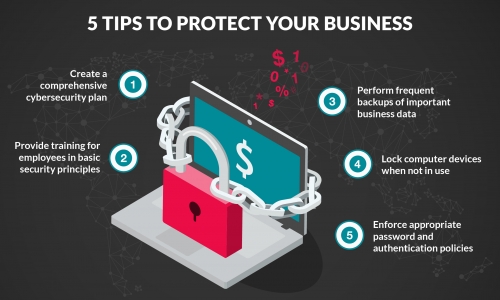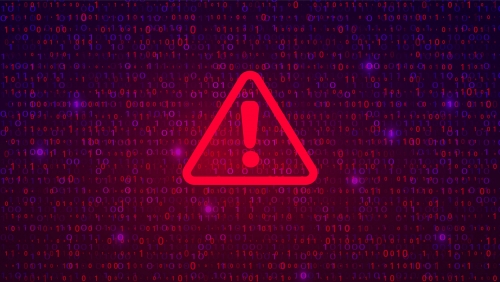Successful criminals know how to strike when it is least expected. And in this era of modern digital technology, this age-old truth can spell trouble for business owners who are solely focused on daily company operations.
Considering the extensive time and energy that it takes to run a business, it isn’t surprising that cybersecurity at a small business gets lost in the shuffle. For every business owner who does not have a cybersecurity plan, there are hundreds of hackers developing one to commit a cyberattack!
Anyone who has read the news headlines over the past several years is aware that cyberattacks on businesses are on the rise. Although the breaches at major corporations tend to capture widespread media attention, these attacks are increasingly prevalent among small- to mid-size businesses.
At Lakeland Bank, we know just how tough it is to juggle everything it takes to keep your business going. But if your business has any kind of online presence, you simply must take the time to ensure its digital infrastructure is fully protected. Being prepared for digital security breaches is essential! You owe it to yourself to read on for more information.
Why Do Small Businesses Need Cybersecurity?
Significant challenges can arise for a business when criminals gain access to sensitive company data as well as its customer, client or vendor information. In addition to the serious legal implications this situation presents, it can affect your business in ways that you may not have considered.
Here are just a few of the vital business operations that can be immensely impacted if no action is taken to protect against a cyberattack:
- Online presence – How would your business be impacted if the website went down? This is an essential question to ask while developing or optimizing your company’s cybersecurity plan. If online communication or transactions via your website are vital to your bottom line, taking measures to protect it from cyberattacks and ensure it operates without interruption is a necessary task.
- Office productivity – Even if a company doesn’t have its own website, it remains highly vulnerable to cyberattacks via email comprise fraud, the use of internet-based applications, and invasion of its computer network. For example, viruses can infiltrate a computer network and slow down computers to such a degree that work productivity comes to a grinding halt.
- Reputation – There are few commodities in the business world more valuable than a company’s reputation. Do customers/clients feel safe doing business with you online and trust that you are protecting their data? By taking proactive cybersecurity steps, you can stop problems before they happen and add a layer of consumer trust that can boost brand loyalty.
The Biggest Cyber Security Threats
Some of the biggest cybersecurity threats faced by small businesses include:
- Phishing Attack – A common email threat, phishing involves waiting for victims to “bite” on a fraudulent online message that is designed to look like it comes from a reputable source. Individuals who fall prey to a phishing attack are often tricked into revealing sensitive personal or company information. Learn How to Identify and Avoid Phishing Scams.
- Malware Attack – This criminal activity, also known as a viral attack, occurs when hackers develop and install malware software to a victim’s computer or other electronic device. The malicious software is designed to do anything from steal sensitive data and exploit an infected user’s online presence to seize complete control of a computer network system.
- Ransomware – This specific form of malware has gotten a lot of press recently and is proving to be costly for both small and large companies as well as government agencies. Using ransomware, cybercriminals hold sensitive information hostage and threaten to publicly publish or permanently block access to it unless a ransom is paid. Get tips on how to protect your business from a ransomware attack.
- Weak Passwords – The average company worker and administrator simply doesn’t take password security as seriously as they should. By following password recommendations in terms of complexity (think numbers, capital letters, and special characters) and application (avoid reusing passwords, take care where you record them, and keep passwords private), you can sidestep some of the most serious security breaches.
Protect Your Business
While business owners should take time to develop and institute a comprehensive cybersecurity plan, they can start protecting their company by training employees in basic security principles, performing backups of important business data, locking computer devices when not in use, and enforcing appropriate password and authentication policies.

No amount of security policies or procedures will prevent a breach if your employees do not understand the importance of cybersecurity and how they can help prevent an attack. It’s up to you to establish a culture of cybersecurity in the workplace.
Are you utilizing Lakeland’s Treasury Management Solutions?
If not, learn how this online banking platform allows your business to control and monitor funds 24/7 and maximize the productivity of your cash resources.
While making all the important business decisions that you face on a daily basis, it is vitally important to keep your guard up when it comes to cybersecurity. If you haven’t already done so, start formalizing an appropriate cybersecurity plan today. Our blogs The Measures You Should Take to Be Cyber Safeand Understanding Tech Support Scams and How to Keep Your Guard Up Against Them provide helpful information. For additional information, visit our blog category, Your Business for relevant articles to help today’s business owner.
Looking for business banking services that offer solutions to meet your needs? We work with businesses like yours on a regular basis, securing loans, providing online services and offering cash management solutions. Call us today at 866-224-1379.




